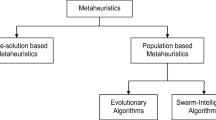Abstract
We demonstrate how the efficiency of Cartesian genetic programming methods can be enhanced through the preferential selection of phenotypically larger solutions among equally good solutions. The advantage is demonstrated in two qualitatively different problems: the eight-bit parity problems and the “Paige” regression problem. In both cases, the preferential selection of larger solutions provides an advantage in term of the performance and of speed, i.e. number of evaluations required to evolve optimal or high-quality solutions. Performance can be further enhanced by self-adapting the mutation rate through the one-fifth success rule. Finally, we demonstrate that, for problems like the Paige regression in which neutrality plays a smaller role, performance can be further improved by preferentially selecting larger solutions also among candidates with similar fitness.



Similar content being viewed by others
References
Edelman GM, Gally JA (2001) Degeneracy and complexity in biological systems. Proc Natl Acad Sci USA 98(13):763–768
Garmendia-Doval AB, Morley DS, Juhos S (2003) Post docking filtering using cartesian genetic programming. In:Liartdet P (ed) Proceedings of the 6th international conference on artificial evolution, pp 435–446
Gajda Z, Sekanina L (2007) Reducing the number of transistors in digital circuits using gate-level evolutionary design. In: Genetic and evolutionary computation conference, ACM, pp 245–252
Gajda Z, Sekanina L (2007) An efficient selection strategy for digital circuit evolution. In: International conference on evolvable systems: from biology to hardware. Lecture Notes on Computer Science 6274, pp 13–24
Goldman B.W., and Punch W.F. (2013). Reducing wasted evaluations in cartesian genetic programming. In: Proceedings of the European conference on genetic programming. Springer, Berlin
Harding S, Miller JF (2005) Evolution of robot controller using cartesian genetic programming. In: Proceeding of the 8th European conference on genetic programming, vol 3447. Lausanne, Switzerland, pp 62–73
Harding S, Graziano V, Leitner J, Schmidhuber J (2012) MT-CGP: mixed type Cartesian genetic programming. In: Proceedings of the 14th genetic and evolutionary computation conference (GECCO). Philadelphia, PA, USA, pp 751–758
Harding S, Miller J, Banzhaf W (2009) Self-modifying Cartesian genetic programming: fibonacci, squares, regression and summing. In: Proceedings of the 12th European conference on genetic programming (EuroGP), vol 5481. Tuebingen, Germany, pp 133–144
Hu T, Payne JL, Banzhaf W, Moore JH (2012) Evolutionary dynamics on multiple scales: a quantitative analysis of the interplay between genotype, phenotype, and fitness in linear genetic programming. Genet Program Evolvable Mach 13(3):305–337
Khan MM, Ahmad AM, Khan GM, Miller JF (2013) Fast learning neural networks using Cartesian genetic programming. Neurocomputing 121:274–289
Kalganova T, Miller JF (1999) Evolving more efficient digital circuits by allowing circuit layout evolution and multi-objective fitness. In: The first NASA/DoD workshop on evolvable hardware, IEEE Computer Society, pp 54–63
Koza JR (1992) Genetic programming: on the programming of computers by means of natural selection. MIT Press, Cambridge
Langdon WB, Poli R (2002) Foundations of genetic programming. Springer, Berlin
Milano N, Pagliuca P, Nolfi S (2019) Robustness, evolvability and phenotypic complexity: insights from evolving digital circuits. Evol Intell 12(1):83–95
Milano N, Nolfi S (2016) Robustness to faults promotes evolvability: insights from evolving digital circuits. PLoS ONE 11(7):e0158627
Miller JF (2011) Cartesian genetic programming. Springer, Berlin
Miller JF, Smith SL (2006) Redundancy and computational efficiency in Cartesian genetic programming. IEEE Trans Evolut Comput 10(2):167–174
Miller JF, Thomson P (2000) Cartesian genetic programming. In: Proceedings of the third european conference on genetic programming (EuroGP), vol 1820.Springer, Berlin, pp 121–132
Miller JF, Job D, Vassilev VK (2000) Principles in the evolutionary design of digital circuits—Part I. J Genet Program Evolvable Mach 1:8–35
Miller JF, Job D, Vassilev VK (2000) Principles in the evolutionary design of digital circuits—Part II. J. Genet Program Evolvable Mach 1:259–288
Miller JF (2019) The alchemy of computation: designing with the unknown. Nat Comput 1–12
Pagie L, Hogeweg P (1997) Evolutionary consequences of coevolving targets. Evolut Comput 5(4):401–418
Raman K, Wagner A (2011) The evolvability of programmable hardware. J R Soc Interface 8(55):269–281
Rechenberg I (1973) Evolutionsstrategie. Friedrich Frommann Verlag (Gunther Holzboog KG), Stuttgart
Rechenberg I (1973) Evolutionstrategie—Optimierung technischer Systeme nach Prinzipien der biologischen Evolution. Frommann-Holzboog, Stuggart
Schumer M, Steiglitz K (1968) Adaptive step size random search. IEEE Trans Autom Control 13:270–276
Schuster P, Fontana W, Stadler PF, Hofacker IL (1994) From sequences to shapes and back: a case study in RNA secondary structures. Proc R Soc Lond B 255:279–284
Tononi G, Sporns O, Edelman GM (1999) Measures of degeneracy and redundancy in biological networks. Proc Natl Acad Sci USA 96:3257–3262
Turner JT, Miller JF (2015) Neutral genetic drift: an investigation using Cartesian genetic programming. Genet Program Evolvable Mach 16(4):531–558
Turner AJ, Miller JF (2014) Recurrent cartesian genetic programming. In: 13th International conference on parallel problem solving from nature (PPSN 2014), LNCS, vol 8672.Springer, Berlin, pp 476–486
Van Nimwegen E, Crutchfield JP, Huynen M (1999) Neutral evolution of mutational robustness. PNAS 96:9716–9720
Vassilev V, Job D, Miller J (2000) Towards the automatic design of more efficient digital circuits. In: Proceedings of the 2nd NASA/DoD workshop on evolvable hardware, IEEE Computer Society, pp 151–160
Wagner A (2008) Robustness and evolvability: a paradox resolved. Proc R Soc B 275:91–100
Wagner A (2011) The origins of evolutionary innovations: a theory of transformative change in living systems. Oxford University Press, Oxford
Wilson DG, Cussat-Blanc S, Luga H, Miller JF (2018) Evolving simple programs for playing Atari games. arXiv preprint arXiv:1806.05695
Acknowledgements
The authors thanks Prof. Julian Miller for insightful discussions and suggestions.
Author information
Authors and Affiliations
Corresponding author
Additional information
Publisher's Note
Springer Nature remains neutral with regard to jurisdictional claims in published maps and institutional affiliations.
Rights and permissions
About this article
Cite this article
Milano, N., Nolfi, S. Enhancing Cartesian genetic programming through preferential selection of larger solutions. Evol. Intel. 14, 1539–1546 (2021). https://doi.org/10.1007/s12065-020-00421-9
Received:
Revised:
Accepted:
Published:
Issue Date:
DOI: https://doi.org/10.1007/s12065-020-00421-9




